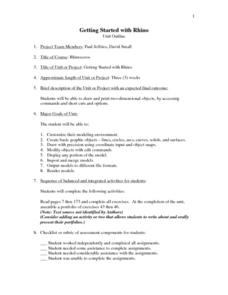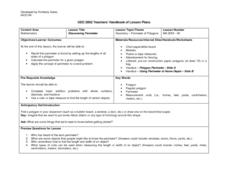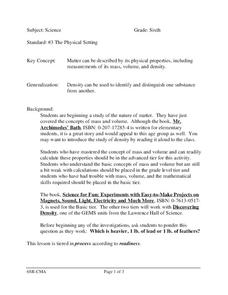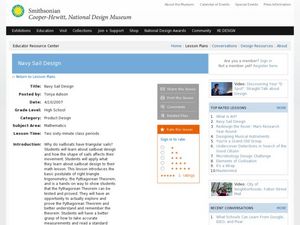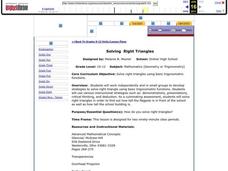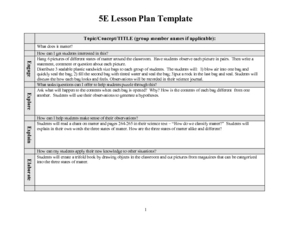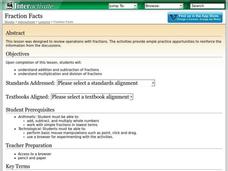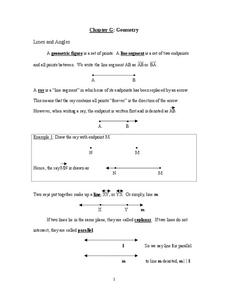Curated OER
Circuit Basics
In this circuits learning exercise, students compare voltage, current, and resistance. Students draw a battery with a resistor, switch, and light bulb. This learning exercise has 6 short answer, 1 matching, and 6 drawing questions.
Curated OER
GPS Receiver Basics
Students practice using a GPS receiver. They walk in different directions and monitor their progress on maps. They enter specific locations and use information given to them to get them back to their original locations.
Curated OER
Measuring Citizenship
Twelfth graders explore citizenship. They discuss what makes a person a citizen of a country. Students examine the differences between resident aliens and naturalized citizens. They discuss the process for becoming a citizen and decide...
Curated OER
Getting Started With Rhino
Students draw and print two-dimensional objects, by accessing commands and short cuts and options. They customize their modeling environment, create basic graphic objects - lines, circles, arcs, curves, solids, and surfaces, and draw...
Curated OER
Dream Bedroom Floor Plan
Students construct using Cabri software. In this geometry instructional activity, students convert between units and apply the correct measurements to build objects. They create the room virtually and manipulate the shapes to the desired...
Curated OER
Russian Dolls Investigation
Pupils measure a set of Russian dolls using the metric system. In this measurement lesson plan, students identify certain relationships between sets of measurements by measuring a set of Russian dolls and presenting their findings to...
Curated OER
Discovering Perimeter
Twelfth graders apply perimeter measurement to items found in newspapers and calculate the cost in terms of feet or yards. They share answers and explanations with classmates.
Curated OER
Physical properties of matter
Sixth graders find the physical properties of matter. In this matter lesson, 6th graders measure mass, volume, and density. Students are broken into 3 tiers with 3 different activities based on their understanding of mass and volume.
Curated OER
Intro to Trigonometry
After being introduced to the basic trigonometry functions, students calculate the height of school landmarks. They experiment with different angles to find the correct height.
Michigan Sea Grant
Water Quality
Learners observe water samples and measure the samples' water quality. Students develop their own criteria for measuring water quality and test for temperature, acidity, oxygen levels, turbidity, conductance, sediment and hardness.
Curated OER
Inequality
Students examine the concept of inequality. They compare and contrast vertical and horizontal inequality and identify methods on how inequality is measured. They research trends of inequality in the United Kingdom.
Curated OER
Navy Sail Design
High schoolers use the Pythagorean Theorem to explore sailboat design. In this Pythagorean Theorem lesson plan, two sides of a triangular sail are measured, and the theorem is used to calculate the third side. A worksheet, bulletin board...
Curated OER
Places and Production
Students calculate United States GDP and GDP per capita, use a choropleth map to acquire information, and create choropleth maps of GDP per capita in South America. They identify regions with high and low GDP per capita
Curated OER
Solving Right Triangles
Young scholars investigate the basic trigonometric functions. In this geometry/trigonometry lesson, students explore strategies to solve right triangles using basic trigonometric functions. The lesson includes an application...
Curated OER
Similar Right Triangles-Introductions to Trigonometry
In this geometry worksheet, students examine similar right triangles as the basis for the foundation of trigonometry. Students define the basic trigonometric functions and use a calculator to find the trigonometric value of an angle. The...
Curated OER
Comparing the Density of Iron
Young scholars use scientific measuring tools to collect and use scientific data. They determine the density of four different objects by using their data to explain why objects have similar/different densities even though they are both...
Curated OER
What Does It Matter?
Students match definitions with vocabulary words and learn basic facts about matter. Then, they see how to determine the physical characteristics of matter. They determine the mass, volume, and density of objects using appropriate tools...
Curated OER
The Social Distribution of Crime
Pupils explore crime within society and the factors that affect it. In this lesson about sociology and crime, students are introduced to key ideas concerning crime and society. Pupils develop an understanding of factors in society that...
Curated OER
Fraction Facts
Students explore the concept of fractions. In this fractions lesson, students perform basic operations such as addition and subtraction with fractions. Students play a game on the computer called 'Fraction Four' that gives students...
Curated OER
Geometry
In this line and angles worksheet, students explore basic geometry vocabulary. They classify polygons. Students determine the area and perimeter of given shapes. They examine the parts of a circle, find volume and...
Curated OER
Weather Watchers
Learners study basic meteorology concepts. They build a simple barometer to measure air pressure. They explore the concepts of relative humidity, air convection currents and temperature inversions and to discover their connection to...
Pennsylvania Department of Education
Extending Pattern Understandings
Students use shapes and manipulatives to demonstrate patterns. In this patterns lesson plan, students also break up patterns to identify a pattern unit.
Curated OER
Quilt Squared
Students study West Virginia quilts. In this mathematics lesson plan, students use symmetry, geometric shapes, and patterns to create their own quilt square.
Curated OER
Similarity of Length, Area, and Volume
In this similarity worksheet, students determine the length, area and volume of similar figures. This three-page worksheet contains explanations, examples, and 20 problems. Answers are provided on page three.



